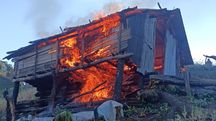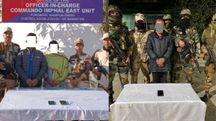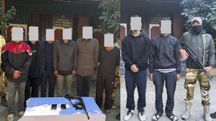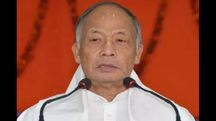33 eminent citizens of Manipur call Editors' Guild report biased and baseless, issue detailed rebuttals
However, most of the reports are based on perception and hearsay with no appropriate media citations and references. There is no honest report of the impact of violence on both communities.
 Editors’ Guild of India
Editors’ Guild of India In a scathing response to the recent report published by the fact-finding team on the ethnic violence of Manipur, a total of 33 concerned professionals have raised strong objections and concerns regarding the accuracy, methodology, and objectivity of the same.
The report was published by Seema Guha, Sanjay Kapoor, and Bharat Bhushan of the EGI teams on September 2.
''We, the undersigned professionals, strongly condemn and denounce the report published by Seema Guha, Sanjay Kapoor, and Bharat Bhushan on 2nd September 2023. The report claims to be a fact-finding mission, commissioned by the Editors’ Guild of India (EGI), on media’s reportage of the ethnic violence in Manipur,'' they said in a letter addressed to Seema Mustafa, President, EGI.
They asserted that the entire report is tainted by bias, lacks a solid foundation, and presumes that other affected parties will pursue their own actions independently.
''The entire report is biased, baseless, and assuming that other entities who will be affected by this report will take their own course,'' the letter read further.
In the letter, the professionals have said that the report has come under intense scrutiny for several critical reasons which are as follows.
1. Methodological flaws: As the title of the report suggests, it was meant to be a “fact-finding on media’s reportage of the violence”. However, most of the reports are based on perception and hearsay with no appropriate media citations and references. There is no honest report of the impact of violence on both communities. Thus, the basic premise of the scope of this mission was compromised right from the start of this report.
2. Inconsistent citations: It is worrying for common citizens like ourselves, who have always seen the media as the fourth pillar of our democracy, twisting facts in the report. The report’s content does not clearly point out the respective media sources of the ‘facts’. There are 6 pictures in the report excluding the cover page picture, ‘Wall of Remembrance’ of the Kuki community. In these pictures, there is a lack of uniformity in providing the sources and details, with some of them having only captions without dates while others have captions with dates.
Two pictures are without caption, date or image courtesy. There is an arbitrary inclusion of visuals without taking into account the details. The image of the burning government forest office at Maultam, Churachandpur burnt on May 3, is reported as a burning Kuki house (ref. Page 7). While we understand that the EGI tweeted on this and rectified the caption, we question the quality and reliability of the fieldwork conducted and the role of EGI in ensuring quality and ethical reporting. We also wonder how the report made it through proofreading, photo editing, and copyediting. Usage of pictures and wrong captions to depict one-sided violence shows a lack of honest and unbiased reportage.
3. Misrepresentation of legal proceedings: The report states that the Manipur High Court, on March 27, ordered the state government to include the Meitei community in the Scheduled Tribes list (ref page 3). The original order from the Honourable High Court of Manipur did not have this recommendation
(ref Honourable Manipur High Court order number WP (C) no. 229 of 2023 dated 19.4.2023). This is misleading and deceptive content about a Court’s proceedings
produced by the EGI.
4. Misleading Information on Evictions: The report’s argument that the eviction from reserved-forest areas was conducted in Kuki-dominated areas and Kukis were singled out (ref page 3) is completely false. We wonder how the factfinding team missed visiting other communities that were also evicted or approaching government departments that had the exact numbers and locations.
The fact is that, from 2015 till 2023, most houses evicted were of Meiteis, so far 143 houses against 59 Kuki houses. Other communities viz. Meitei pangals (137 houses), Nagas (38 houses) and Gorkhas (36 houses) were also evicted. On the other hand, a recent report from Narcotics and Affairs of Border (NAB) suggests that the scale of poppy cultivation in Manipur has spread across 15,400 acres of land in the hills between 2017 and 2023. Of this, 13,122 acres were in Chin-Kuki-dominated areas, 2,340 acres in Naga-dominated areas and 35 acres under others.
These two official figures are crucial to underscore the fact that the drive against illegal encroachment has no direct link to poppy cultivation, which anyone from a neutral media entity should have brought forward to the public. The fact-finding mission has failed here again by producing misleading content.
5. Biased Portrayal of Meira Paibis: The report has a section on Meira Paibis (ref page 8 and 9), that are not media reportage or even facts but opinions of the three authors to portray Meira Paibis in a bad light. For instance, phrases such as ‘forgetting their feminist past’,‘showed no remorse’, ‘normal rules no longer applied’, and ‘cheerleaders of the violent mobs’ are baseless allegations.
The whole section writes only about the agitations by Meira Paibi while completely overlooking the media reportage of Meira Paibis’ demonstrations for restoration of peace and condemnations of sexual assaults. There are sweeping statements all over the section. The last two paragraphs show Kuki women as the only women ‘victims’ and engaging in similar agitations but in a ‘peaceful’ way.
The report writes about the humiliation of the ‘three Kuki women’ in the same paragraph about general women and children as the worst sufferers, thereby portraying the Kuki the women and children as the victims.
6. Misquotation of Internet Ban Judgement: The section titled, ‘Banning the Internet’ refers to Anuradha Bhasin's judgement of the Supreme Court (ref page 18) and says that “The judgement limits the ban to 15 days” which is not true as the judgement does not mention any specific time limit for the internet ban.
Rather, it is the Temporary Suspension of Telecom Services (Amendment) Rules, 2020 with newly inserted subrule (2A) to the Temporary Suspension of Telecom Services (Public Emergency or Public Service) Rules, 2017 amended in 2020 which says that “The suspension order issued by the competent authority under sub-rule (1) shall not be in operation for more than fifteen days”. The report has wrongly lifted the reference for 15 days limit from the Internet Freedom Foundation (IFF) article which says that “it violates Rule 2(2A) of the Telecom Suspension, 2017, as amended in 2020, after the Supreme Court in Anuradha Bhasin v. Union of India” without referring to the source material. While condemning the internet ban, it is not expected to object to it using misleading statements.
While the EGI report talks in detail about internet ban and fake news, the team ends up providing selective information. This can be evidenced by their not reporting about uninterrupted internet service in Chin-Kuki-dominated Churachandpur. It is an important fact that even a notice was issued by H Gyan Prakash, Commissioner (Home) on 31st May 2023 asking for justification for relaxing the internet ban in Churachandpur District despite the state government order suspending internet service throughout the state from 3rd May 2023 and ordering a probe into misuse of the internet. Similarly, one incident under the Fake News and Disinformation (ref page 22), narrates about a particular Imphal-based newspaper covering a biased report on the desecration of a temple on August 3.
However, it ignores the fact that the same newspaper the very next day carried the same news with corrections on its front page.
7. Lack of professionalism: It is evident from the facts that they reported a state cadre police officer as an Indian Police Service (IPS) officer and the report’s cover page carries the photograph of Kuki “Wall of Remembrance” for a fact-finding report. The cover page carries one picture from only one community ignoring the other severely impacted community. The major part of the report has used the Kuki and cognate tribes as Kuki-Zo communities whereas historically they are referred to as Chin-Kuki communities in the government records. This is paramount to supporting their strategy to legalise the recent immigrants from Myanmar to India.
8. Violation of journalistic ethics: The Conclusions and Recommendations section’s first point states that journalists of Manipur wrote one-sided reports. The irony is that this report itself is a one-sided narrative portraying one community as the perpetrators of violence and the other as the victims. Violence of this kind has continued for 4 months due to its two-way attacks. The report has not maintained neutrality and objectivity, thereby violating journalistic ethics.
The professionals further alleged that the EGI, a trusted body in India, possibly had not examined and scrutinised the report before it was published.
''The EGI claims to work for protecting press freedom and for raising the standards of editorial leadership of newspapers and magazines. However, with a very biased and misinformed report on Manipur, as evidenced from the above points its ‘FactFinding Team’ has done great injustice to its own reputation and contributed to fake news factories which are working overtime to destroy the peace-building process in the tiny state of Manipur,'' they added.
In the letter, they claimed that the EGI has joined the information war rather than fighting against it, adding, ''Presentation of facts and evidence from reliable sources to establish accuracy and team’s recommendations towards restoration of peace in Manipur would be highly appreciated''.
''We demand complete scrapping of the report and deployment of a more competent team, consultation with all affected communities and contributing to a broader peace-building process,'' the letter concluded.
Copyright©2025 Living Media India Limited. For reprint rights: Syndications Today









